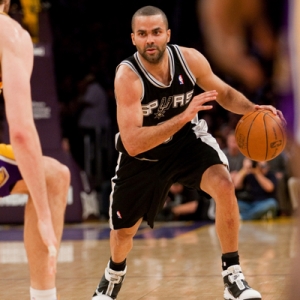Handicapping Major NBA Injuries
by Trevor Whenham - 3/11/2010
![]()

The injury to Tony Parker last week - he's out for six weeks with a broken hand - got me thinking about injures in the NBA. It seems like a lot of big name players have been missing significant time this year. Sometimes teams have handled it fairly well - like New Orleans without Chris Paul. Other times it's been a disaster - like when Chris Bosh recently went out, and Toronto lost all of the significant momentum they had built up. The challenge for bettors is obvious - to try to determine what the impact of an injury to a star player is likely to be. That's more of an art than a science, but it is definitely possible to develop a bit of a checklist - questions you can ask yourself to help get a sense of what is likely.
The goal, obviously, is to try to determine the real value of a player, and the real impact of the loss, as opposed to the impact that the public will assume based on the player's name, or that the popular sports media will suggest in their bid to attract eyeballs. So, how do you do that? Here are eight questions that are on my checklist:
What do the stats say? - This seems straight forward, but it's up to you to determine what works best for you, and what's important for different positions and types of players. For example, you might assess the true value of a center based on his offensive rebounding percentage, while with a point guard you might be more interested in his assist-to-turnover ratio. There is no specific, correct way to use statistics - the application of them is very subjective and personal. What's important is that you apply statistical analysis that you are comfortable with to get a good sense of what you think the real impact of the player is.
How good is the backup? - This stuff isn't rocket science. The better the player who is replacing the starter is, the better the team is going to do. New Orleans was fine without Paul because Darren Collison was ready for prime time. Toronto struggled because Bosh is the heart and soul of everything they do. It's important here that you don't base your assessment on the name recognition of the backup, or on the stats he has amassed in limited opportunities to play, but that you try to extrapolate what he could be capable of as a starter from what he has done in the past.
How much time will the player miss? - The longer a player is out, the bigger the impact can be on a team - both in terms of play and psychologically. Your job, then, is to get a sense of how long the player is going to be out. You can rely on what the team and the media tells you, but not entirely. It's useful to back up what you hear by looking at how long other players have been out of action with similar injuries.
What the upcoming schedule? - It's much easier for a team to survive a homestand against average teams then it is to survive a long road trip against contenders. The schedule has a major impact on the impact of an injury - especially if the injury isn't likely to keep the player out for months.
Where are we in the season? - A team in the midst of a serious charge for the playoffs could be more significantly affected by a key injury than that same team would be in November. Every game counts the same in the standings, but that doesn't mean that each game has the same significance in the minds of players, teams, and fans.
What happened in the past? - History is your best friend in these situations. Has the player been hurt before? What happened to the team when he was? How has the team changed since? How about the player's role? Looking backward can be the best way to guess what lies ahead.
What happened to similar teams in similar situations? - If the team in question has lost a top-level point guard, then what happened the last time they lost their point man? Or what has happened when a similarly competitive team lost their court general for an extended time?
How is the public going to react? - It's not enough to just determine what you think the impact of the loss is going to be. You also need to get a sense of how the public could react. When your perceived outcome differs significantly from the public's likely perception then you have real value.
Most Recent NBA Handicapping
- NBA Betting: Atlanta Hawks Season Long Handicapping 12/26/2025 vs. Miami Heat
- NBA Players Who Transformed Their Career After a Trade
- Top 5 NBA Players Who Should’ve Stayed With Their Original Team
- NBA Betting: Atlanta Hawks Season Long Handicapping 12/23/2025 vs. Chicago Bulls
- Hot and Cold NBA Betting Teams ATS and Over Under 12/22/2025
- NBA Betting Trends Analysis and Expert Handicapping 12/22/2025
- NBA Betting: Atlanta Hawks Season Long Handicapping 12/19/2025 vs. San Antonio Spurs
- NBA Betting: Atlanta Hawks Season Long Handicapping 12/18/2025 vs. Charlotte Hornets
- NBA Players Who Would’ve Been Great in Any Era
- 5 NBA Players Who Played for a Record Number of Teams
